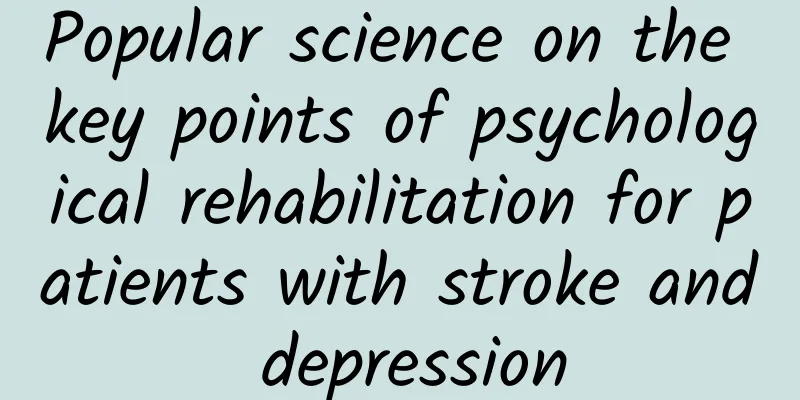Popular science on the key points of psychological rehabilitation for patients with stroke and depression

|
1. What is stroke depression? Stroke depression is a typical psychological disorder and a very common complication of stroke in clinical practice. Its main manifestations include low mood, lack of interest in everything, self-denial, decreased attention and memory, etc. This complication can have an adverse effect on the patient's rehabilitation effect and quality of life. According to statistics, about 30% of stroke patients will suffer from this disease. If symptomatic intervention is not carried out in time, it may lead to sexual dysfunction, sleep disorders, etc., and even suicide. 2. What is the mechanism of stroke-related depression? At present, the pathogenesis of this complication is still not very clear. It is generally believed that damage to the monoamine ascending projection system, the prefrontal cortical circuit, abnormalities in the HPA axis, neural plasticity, pro-inflammatory factors and changes in glutamate neurotransmitters are all related to the occurrence of this complication. 3. What are the key points of psychological rehabilitation for stroke patients with depression? (1) Strengthen health education In order to prevent and improve stroke depression, health education in this regard should be carried out in advance, and the education targets are not limited to the patients themselves, but also include the patients' families. For patients, education can be carried out through lectures, face-to-face conversations and discussions. Attention should be paid to using easy-to-understand language to ensure that patients can understand, and more mental health knowledge should be given so that patients can correctly view their own diseases, recognize their current situation, and recognize the importance of actively cooperating with treatment to improve their condition. Don't be too pessimistic about the condition. In addition, some patients are worried that their condition will burden their families, or worry about recurrence or deterioration of the disease, so they should be comforted according to the actual situation of the patients. For the patients' families, more comprehensive education should be carried out. This is because most of the patients' families have not really been exposed to such diseases, which has caused them to not do a good job in diet, exercise and other care, and they cannot resonate with the patients psychologically, and cannot truly understand the patients' pain. These behaviors are also important factors leading to depression in patients. Therefore, it is necessary to guide the patients' families to systematically learn stroke-related knowledge so that they can promptly detect changes in the patients' condition, improve the patients' situations and negative emotions, and then provide the patients with more scientific care and more understanding, thereby creating a better family atmosphere for the patients and improving the patients' depression. (2) Strengthening basic nursing care The content involved in psychological rehabilitation is very complicated. If psychological rehabilitation is carried out blindly without understanding the patient, it will not only fail to achieve the desired effect, but may even be counterproductive. Therefore, before carrying out psychological rehabilitation, it is necessary to strengthen basic care and collect all aspects of patient information, including the patient's age, education level, personality characteristics, work (industry), family members (whether married? Do you have children?), family economic conditions, previous interests and hobbies, etc. Only in this way can we better understand the patient's true thoughts and psychological needs. Usually, we should communicate with the patient more to establish a good relationship so that the patient can open his heart and speak out his true thoughts. Only in this way can we be targeted when carrying out psychological rehabilitation and improve the effect of psychological rehabilitation. (3) Pay attention to communication skills and service attitude There is a Chinese proverb that goes, "A kind word warms you in three winter months, but an evil word hurts you in six months." This is true for ordinary people, let alone stroke patients with depression. In the process of psychological rehabilitation, good communication skills and a gentle service attitude are very important. When communicating with stroke patients with depression, try to share some positive information and release some positive signals with them, so as to give them positive guidance. In particular, you can share more case information with good stroke rehabilitation effects, which can improve the patient's confidence in treatment, eliminate the patient's concerns, and improve their depression. In addition, you should use civilized language, pay attention to the tone and intonation when speaking, do not be indifferent, and do not speak ill of each other. You can get closer to the patient by chatting about family matters, the weather, and topics that the patient is interested in. The "good results" achieved by the patient in the daily rehabilitation training should be affirmed and encouraged in time to restore the patient's confidence and improve his depression. If the patient is deeply depressed and cannot extricate himself, you can also relieve his depression by distracting his attention, such as playing chess with the patient, talking about topics that interest them, and playing their favorite movies and TV shows for the patient. (4) Timely identification and resolution of patients’ practical difficulties Most stroke patients will have sequelae of varying degrees, such as aphasia, hemiplegia, decreased reaction/mobility, etc., which also cause a lot of inconvenience in their daily lives. These sequelae will also cause patients to have inferiority complex. On the one hand, they are unable to complete seemingly simple things in the past (such as going to the toilet by themselves), and on the other hand, they are unwilling to trouble others, which will aggravate the patient's depression. Therefore, it is necessary not only to communicate more with patients, but also to be good at observation, so as to discover the patient's difficulties in time, and actively help patients solve problems, and also to express to patients: they are not a "burden" to others, and do not have mental burdens. Author: Cao Ling, Lulong County Hospital, Hebei Province |
<<: Night Listening | "Protein correction" can cause cancer? Hair care advice: do this!
>>: Introduction to conventional treatment methods for cerebral hemorrhage
Recommend
Vulvar swelling and pain during menstruation
The vagina has always been the most important pro...
Why do I get hungry quickly during late pregnancy?
Many pregnant women have a poor appetite during p...
Can I drink dehumidifying tea during my period?
I believe that everyone has begun to feel a littl...
Female buttocks and thighs are cold
In daily life, some women often have cold buttock...
Menstruation comes two weeks early
Generally speaking, it is quite common for menstr...
17 Social Media Updates That Are So Disgusting That You'll Throw Up a Hoo
Here are 17 social network updates that are so di...
Brown discharge during pregnancy
We all know that after a woman becomes pregnant, ...
Which hospital is good for treating uterine fibroids and what are the treatment methods?
Once there is a problem with the uterus, it poses...
Can I hula hoop during my period?
Women can do some simple exercises during menstru...
Does the study room have to be independent? How to design a study room that is not independent?
We all know that many people will set up a study ...
What are the disadvantages of improper breast augmentation with implants?
Modern women are increasingly pursuing exquisite ...
Don't touch your breasts like this
Self-examination is one of the most basic ways to...
Can sprouted pine nuts be eaten? In what environment do pine nuts grow?
Pine nuts are very nutritious nuts. People may no...
What are the reasons for delayed menstruation and breast swelling?
Delayed menstruation and breast distension are co...









